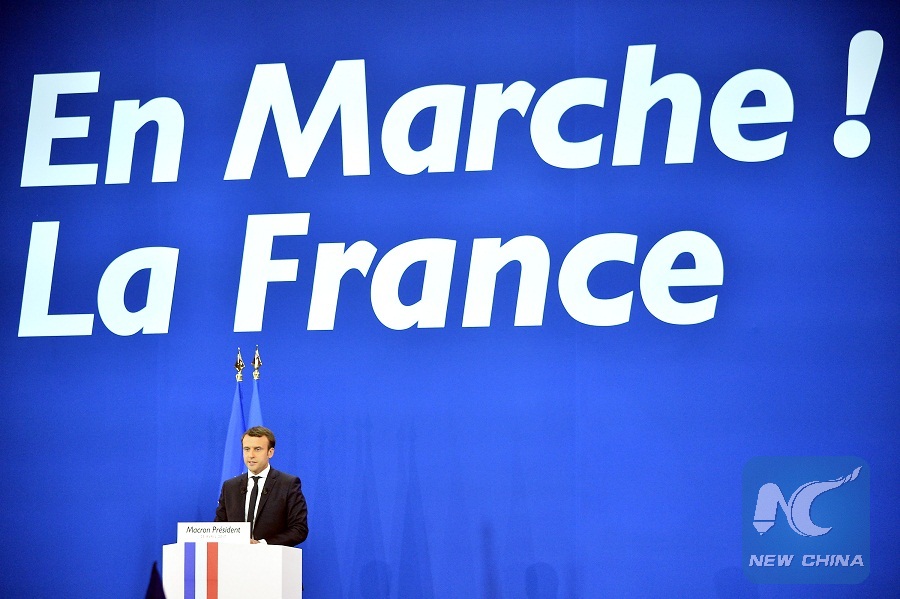
Emmanuel Macron, French presidential candidate for the On the Move (En Marche) movement, delivers a speech at a rally after the first round of French presidential election in Paris, France on April 23, 2017. (Xinhua/Jose Rodriguez)
PARIS, April 25 (Xinhua) -- France's first round election sent pro-market, pro-European Union centrist Emmanuel Macron and anti-euro, anti-immigrant far-right candidate Marine Le Pen to a runoff on May 7 when voters will have to choose to between the two.
The two frontrunners have shaped a new political landscape by knocking out traditional parties, but winning the presidency with a majority may still turn hard for both of them.
Opinion polls predict that the business-friendly Macron, who has never held elected office, would seize a large lead in the second round against Le Pen after two defeated challengers offered to back him to reject the anti-immigrant and anti-Europe platform.
In a latest support in a string of rallies, outgoing president Francois Hollande said backing his former economy minister would preserve the country's unity and social model in face of populism.
"I will vote for Emmanuel Macron. He is the one who can defend our values which maintain the French unity during this particular period," Hollande said in a television address.
Clear favorite in polls and enjoying a series of rallies, ex-investment banker is likely to boost his chances to win power on May 7.
However, an untested policy and still fragile "On the Move" party he created a year ago, may challenge the novice to gather a strong majority in legislative election to transform his campaign pledges into deeds.
He said his party is planning to field candidates in all 577 constituencies in the upcoming legislative election, with half of them having no previous parliamentary experience, which prompts opponents to cast doubt on his ability to win enough seats in the lower-house National Assembly.
Furthermore, with no establishment party on his back, Macron's young movement lacked a party's machinery needed to win parliamentary contest in June.
If failing to score a large victory in the parliamentary election, Macron will be likely dependent on one of the main political parties to implement his policies, which the currently ruling Socialist party might consider too pro-market and the conservative right party might see as a continuity of the Socialist government.
Speaking to Xinhua, Madani Cheurfa, secretary general of the Political Research Center of Sciences Po (CEVIPOF) said the parliamentary elections in June will be "more important than ever."
"The legislative elections will show if the winner of the second round will have a large majority or a coalition. This would make us enter into a France where the practice of power will be more animated, more intense," he added.
The outcome of Sunday's vote offered relief to morose markets which feared radicals could rule the European Union's second largest economy for next five years. Stocks in France and in Europe reported a sharp gain after Macron came out on top in the first round election. However, eyes now are on parliamentary election.
"It is highly likely that Macron will be elected president, but he will then lead a country whose political divide is unprecedented, leaving open the question of whether he will have a majority to govern," Bruno Cavalier, an economist at Oddo Securities, wrote in a note.
As for Le Pen, a high turnout could improve the far-rightist's score but not much enough to break glass ceiling and defy "everything except Le Pen" voting prospect.
Erwan Lestrohan, director of opinions department at BVA pollster, expects that continued terror threats and rising risks of immigration crisis give a boost to Le Pen who embraces a protectionism approach. But, the 48-year-old lawyer does not have enough solidity to win the presidential run-off.
In 2002, Jean-Marie Le Pen, father of the far-rightist candidate and founder of National Front party, cruised to the second round after beating Socialist rival Lionel Jospin, prime minister of then president Jacques Chirac, a fact that triggered massive protests against the far-right.
In the second decisive round, Le Pen failed to snatch the first place with a poor score of 17.79 percent against Chirac who seized a large victory of more than 80 percent after the right and the left parties rallied around him.
Thomas Guenole, political scientist and professor at Sciences Po, predicts the same scenario for this year's presidential race.
Defiant Le Pen clung on her chances as the president "of people". She promised to protect French citizens against "savage globalization" and " to defend the French nation, its unity, its security, its culture, its prosperity and its independence."
"We can win. We will win. Things have changed a lot. The movement I lead has been at the top of all the last election," she told France 2 television.
She said contacts with the center-right are in progress in an attempt to seek a possible alliance.
Macron and Le Pen will face off in a decisive runoff on May 7.















